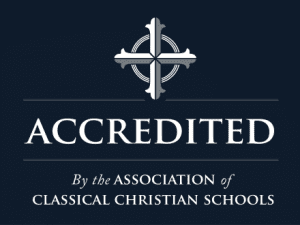What is Commonplacing?
An Ambrose Parent Education article by Carl Warmouth, Dean of the Grammar School
Dear Ambrose families,
Hello again. Recently I wrote a short note about integration and grade level themes and explained how we use catechism questions and answers as a support tool to help teach those themes. Another tool is the practice of commonplacing. Special thanks is due to 6th Grade teacher, Ms. Dotters, and Upper School teacher, Mr. Browne, for their contributions to this article.
What is it?
A commonplace book is a treasured book of quotes and ideas encountered by a reader. It serves as a reader’s memory: a central location to keep and store those quotes and ideas, where they can be easily found and accessed over a lifetime. At Ambrose we issue students a new commonplace book in Kindergarten, 4th grade, 6th grade, School of Logic, and School of Rhetoric. Our hope is that these books will be heirlooms passed along to future generations of family.
Keeping a commonplace book is a time-honored tradition dating back to at least the middle of the 15th century. Such notable luminaries as John Milton, Francis Bacon, John Locke, Virginia Woolf, and Ronald Reagan kept commonplace books. Though one can argue that the proliferation of information in the 21st century has made keeping a commonplace book obsolete, the opposite is actually true: the constant drone of information along with the incessant distractions of the digital age have made commonplacing even more important than ever.
Why is commonplacing so important?
Commonplacing serves six instrumental purposes in the intellectual life of a person:
- It serves as a central repository for great ideas and quotes encountered by a reader; in short, it serves as a reader’s memory.
- It encourages attentive reading as readers actively look for engaging, influential, and beautiful passages and ideas within a book.
- It empowers a reader to engage with and meditate on passages as he locates them, transfers them from book to book, and sees them topically with other passages from other authors within his commonplace book.
- It facilitates a reader assimilating a passage – getting it from the written word into his own memory – through the careful process of copying it from one place to another.
- It teaches students the vocabulary and meaning of their grade theme.
- It cultivates the discipline of wonder. In the upper school, students practice philosophizing within the Great Conversation. The Grammar School aims to prepare them for such wisdom seeking. In order for anyone to be interested in philosophy, or to love wisdom, they must first be struck with wonder. For philosophizing is ruled and directed by wonder.
Carl Warmouth, Grammar School Dean
 Carl is the Grammar School Dean for our 5-day program. He was the headmaster at Trinity Christian School in Opelika, Alabama before coming to The Ambrose School in 2014.
Carl is the Grammar School Dean for our 5-day program. He was the headmaster at Trinity Christian School in Opelika, Alabama before coming to The Ambrose School in 2014.
“I first became convicted of the value of classical Christian education in 1999 after my wife began teaching at a classical Christian school and we enrolled our oldest child there. After reading Recovering the Lost Tools of Learning, Excused Absence, and The Paideia of God by Doug Wilson, I sensed God calling me to be involved in a greater way. After considerable time spent seeking God, I made a career change and was hired as the upper school principal at Trinity Christian School. The following year I was asked to serve as headmaster. My two children both received a K-12 classical Christian education. My son graduated from Ambrose in 2017 and my daughter continued her classical Christian education at New Saint Andrews College in Moscow, Idaho. My wife has been a grammar school teacher now for more than 18 years. I believe deeply in the vision and mission of The Ambrose School, and am honored to be a part of it.
My previous experience includes nine years in the resort industry and 10 years in child and family counseling as the Therapeutic Program Director at a residential treatment center for emotionally disturbed children. I love the people and culture of the Treasure Valley and the opportunities for outdoor adventure.”



